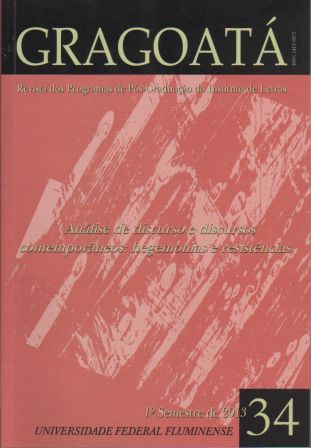The emergency of the desiring subject in the MST discourse
DOI:
https://doi.org/10.22409/gragoata.v18i34.32957Keywords:
discursive locus, subject position, discursive formation, metaphorical process, production of desire, pulsional socio-political agency, desiring subjectAbstract
In the present text, I resume the terms occupation/ invasion in order to investigate a very peculiar sense for invasion that appeared in an interview with Diolinda Alves de Souza, MST leader, in December 6, 1995, for the Variety leaflet of Folha de São Paulo. In this interview, I was interested in examining the process of subjectification/ identification in Deolinda´s phrasing: in a certain moment, while referring to her first occupation, she uses the term invasion. In doing so, the interview does not address what the subject can/ must say from its discursive locus. This term does not correspond to the mode of subjectification in her Discursive Formation, so well defined in the interview until that point. This sliding of occupation to invasion, allows us to identify a specific metaphorical process. A metaphorical process is “a non-subjective process in which the subject is constituted” (Pêcheux, 1988:130). And more: metaphorical process consists of a “socio-historical process that serves as the foundation for the ‘presentation’ of objects to subjects” (idem, p.132). I understand that this specific metaphorical process allows us to discern the moment in which the political subject is thrown back into its memories from which he emerges as a desiring subject.
Downloads
Downloads
Published
How to Cite
Issue
Section
License
Authors who publish in Gragoatá agree to the following terms:
The authors retain the rights and give the journal the right to the first publication, simultaneously subject to a Creative Commons license CC-BY-NC 4.0, which allows sharing by third parties with due mention to the author and the first publication by Gragoatá.
Authors may enter into additional and separate contractual arrangements for the non-exclusive distribution of the published version of the work (for example, posting it in an institutional repository or publishing it in a book), with recognition of its initial publication in Gragoatá.

Gragoatá is licensed under a Creative Commons - Attribution-NonCommercial 4.0 International.














